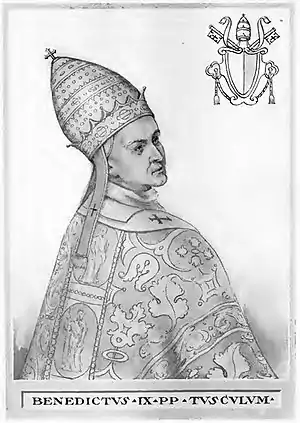1032
Year 1032 (MXXXII) was a leap year starting on Saturday (link will display the full calendar) of the Julian calendar.
| Millennium: | 2nd millennium |
|---|---|
| Centuries: | |
| Decades: | |
| Years: |
| 1032 by topic |
|---|
| Leaders |
|
| Birth and death categories |
| Births – Deaths |
| Establishments and disestablishments categories |
| Establishments – Disestablishments |
| Gregorian calendar | 1032 MXXXII |
| Ab urbe condita | 1785 |
| Armenian calendar | 481 ԹՎ ՆՁԱ |
| Assyrian calendar | 5782 |
| Balinese saka calendar | 953–954 |
| Bengali calendar | 439 |
| Berber calendar | 1982 |
| English Regnal year | N/A |
| Buddhist calendar | 1576 |
| Burmese calendar | 394 |
| Byzantine calendar | 6540–6541 |
| Chinese calendar | 辛未年 (Metal Goat) 3728 or 3668 — to — 壬申年 (Water Monkey) 3729 or 3669 |
| Coptic calendar | 748–749 |
| Discordian calendar | 2198 |
| Ethiopian calendar | 1024–1025 |
| Hebrew calendar | 4792–4793 |
| Hindu calendars | |
| - Vikram Samvat | 1088–1089 |
| - Shaka Samvat | 953–954 |
| - Kali Yuga | 4132–4133 |
| Holocene calendar | 11032 |
| Igbo calendar | 32–33 |
| Iranian calendar | 410–411 |
| Islamic calendar | 423–424 |
| Japanese calendar | Chōgen 5 (長元5年) |
| Javanese calendar | 934–935 |
| Julian calendar | 1032 MXXXII |
| Korean calendar | 3365 |
| Minguo calendar | 880 before ROC 民前880年 |
| Nanakshahi calendar | −436 |
| Seleucid era | 1343/1344 AG |
| Thai solar calendar | 1574–1575 |
| Tibetan calendar | 阴金羊年 (female Iron-Goat) 1158 or 777 or 5 — to — 阳水猴年 (male Water-Monkey) 1159 or 778 or 6 |

Pope Benedict IX (r. 1032–1044)
Events
Byzantine Empire
- Spring – Emperor Romanos III (Argyros) sends a Byzantine expeditionary army under General Michael Protospatharios, which includes Western auxiliaries and elite troops of Asia Minor, to reinforce the Byzantine position in Calabria (Southern Italy).
Europe
- September 6 – King Rudolph III dies without any heirs. He bequeaths his entire dominions to Emperor Conrad II (the Elder), dispatching to him the Holy Lance and ring of St. Maurice, symbols of Burgundian investiture.
- Odo II, count of Champagne, invades Burgundy and seizes most of the kingdom for himself.[1] With the assistance of Humbert I of Savoy, Queen-dowager Ermengarde (Rudolph III's widow) flees to the safety of Zürich.
- Winter – Conrad II marches with his army into Champagne and devastes the land – forcing Odo II to sue for peace and swear to abandon Burgundy. The bishops prevent Conrad from seizing control of Burgundy.
- The first mention is made of Kursk, Russia, in the hagiography of Theodosius, who becomes a monk at the Kiev Caves Monastery (approximate date).
Religion
- October – Pope John XIX dies after an 8-year pontificate at Rome. He is succeeded by his nephew Benedict IX as the 145th pope of the Catholic Church, while (probably) still in his teens.
Births
- February 16 – Ying Zong, Chinese emperor (d. 1067)
- September 3 – Go-Sanjō, Japanese emperor (d. 1073)
- September 14 – Dao Zong, Chinese emperor (d. 1101)
- Abe no Munetō, Japanese nobleman and samurai (d. 1108)
- Cheng Hao, Chinese neo-confucian philosopher (d. 1085)
- Donald III (the Fair), king of Scotland (approximate date)
- Ermengol III (or Armengol), count of Urgell (d. 1065)
- Gao, Chinese empress consort and regent (d. 1093)
- Gyrth Godwinson, English nobleman (approximated date)
- Hugh de Grandmesnil, Norman warrior and sheriff (d. 1098)
- Osbern FitzOsbern, bishop of Exeter (approximate date)
- Touzi Yiqing, Chinese Zen Buddhist monk (d. 1083)
- Vratislaus II (or Wratislaus), king of Bohemia (d. 1092)
Deaths
- July 28 – Constance of Arles, French queen
- July 29 – Matilda of Swabia, German duchess
- September 6 – Rudolph III, king of Burgundy
- October 4 – Sancho VI, duke of Gascony
- Ahmad Maymandi, Ghaznavid vizier
- Arslan Yabgu, Turkic chieftain and ruler
- Bezprym (or Besfrim), duke of Poland
- Constantine Diogenes, Byzantine general
- Gille Coemgáin, king of Moray (Scotland)
- John XIX, pope of the Catholic Church
- Li, Chinese consort and concubine (b. 987)
- Li Deming, Chinese rebel leader (b. 981)
- Odo II, margrave of the Saxon Ostmark
- Otto Orseolo (or Ottone), doge of Venice
References
- C.W. Previté-Orton, The Early History of the House of Savoy, (Cambridge University Press, 1912), p. 30.
This article is issued from Wikipedia. The text is licensed under Creative Commons - Attribution - Sharealike. Additional terms may apply for the media files.